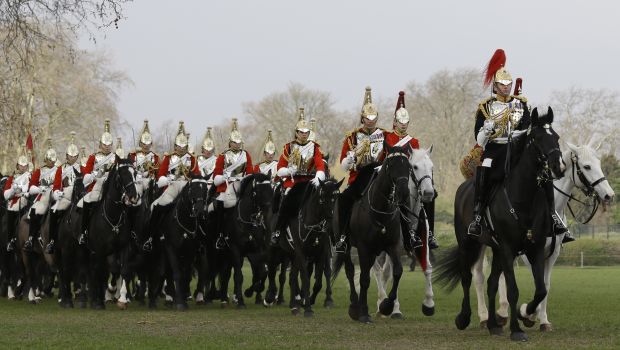Fans of classical Western movies know that whenever the “good guys” are about to be massacred by “the baddies,” the US cavalry appears at the eleventh hour to save the day.
Since the disintegration of the Ottoman Empire after the First World War, a real-life version of that cinematic metaphor has been part of Middle Eastern geopolitics.
Each time those perceived as the “baddies” have laid siege to those regarded as “the good guys,” a Western power, first the UK and later the United States, have dispatched the “cavalry” to the rescue.
The “cavalry” protected many regimes against the Soviet threat, as was the case in Iran under the Shah, but they also saved other regimes from bullying by old imperialists, as was the case with Egypt in the Suez crisis. It prevented the Iranian mullahs from marching on Baghdad and, later, forced Iraqi leader Saddam Hussein out of Kuwait. The “cavalry” rescued regimes in Lebanon and Jordan while providing Israel with an additional life insurance. It also brought regime change in Afghanistan and Iraq while prolonging the lives of regimes past their sell-by date.
Now, however, there is no cavalry. This is the message that Middle Eastern leaders should contemplate. With the US in retreat, the West lacks the leadership to use its power to arbitrate the conflicts that dot the region’s political landscape.
One could debate the rights or wrongs of this situation forever. The fact is that, for a number of reasons, no cavalry is going to arrive. To start with, the end of the Cold War reduced the region’s geopolitical importance. Even if Russian President Vladimir Putin tried to play “superpower,” few people believe Russia would pose a global challenge.
The second reason is that Western powers are no longer as dependent on Middle Eastern crude oil as they were a generation ago. In 1980, the region accounted for 43 percent of the global oil market. In 2012 that figure was down to 20 percent. Even then, new consumers such as China and India accounted for a good part of the total.
The third reason is that the bipartisan concord that for decades marked foreign policy in Western democracies has been shattered.
In the US, President Barack Obama is prepared to see Iraq go up in flames to prove that former US President George W. Bush was wrong to topple Saddam. At the other end of the spectrum, US Senator John McCain is also prepared to see the same smoke rising in the skies to prove that Obama is an incompetent leader.
In Britain, bashing former prime minister Tony Blair over Iraq has become a national pastime, rendering serious discussion impossible. The trouble is that neither Western nor Middle Eastern leaders are prepared to acknowledge these new realities.
Western leaders still foster the illusion that they exercise global leadership, which gives their public a sense of self-satisfaction. For their part, many Middle Eastern leaders still think that whatever they do, the Western powers will be forced to come to their rescue. They are like the big banks that thought they were too big to fail.
The result of this double refusal of reality is that Western and Middle Eastern leaders are dragged into a world of make-believe in which they appear to be doing something, while actually they are doing nothing. As a result, we get such disingenuous remarks as those made by US Secretary of State John Kerry with regards to cooperation with Iran against the so-allied Islamic State of Iraq and Syria (ISIS). Kerry says that the topic was “raised” on the margins of talks over Iran’s nuclear project. He added that any deal that might emerge would not include “military cooperation.”
Kerry’s statement contains two important messages. The first is that the ISIS challenge is something marginal to be discussed on the sidelines of other negotiations. The second is that the US is ready to do “everything”—except the only things that could make a difference: that is to say, using air strikes against ISIS while Iran props up Iraqi ground forces to recapture the lost cities.
For its part, Tehran knows that any commitment of Iranian troops could make a bad situation worse. The mullahs are trying to use ISIS as an excuse for currying favor with the “Great Satan” while protecting their nuclear project. Neither of the putative partners gives a toss about Iraq. In Tehran, they are suddenly talking of the Treaty of Qasr-e Shirin (1723) that gives Tehran a right of inspection over the Shi’ite regions of what was then part of the Ottoman Empire.
Come to think of it, Obama’s equivocation may be a blessing in disguise. I shudder at the thought of the US becoming involved in a major conflict with someone like Obama as commander-in-chief. As a skilled politician in the American context as far as winning elections through trompe l’oeil populism is concerned, Obama lacks the intellectual ability, the practical knowledge and the moral stamina needed to lead a superpower in a major crisis. What his position lacks is consistency. He could correct that by synchronizing his words with his (in)action. The Hippocratic injunction, “first do no harm,” could also be applied to politics.
Since Obama is determined to do nothing, he had better also say nothing, especially when it comes to drawing “red lines.” If he controlled his tongue, the leaders and peoples of the region would have to stare at the abyss and seek a way out. Knowing that there would be no cavalry riding in on their white horses, they would be forced to grow up and start sorting out their own problems.
Right now, only Iraqis can save Iraq, if they indeed want Iraq to continue to exist. No one else can do it for them.
